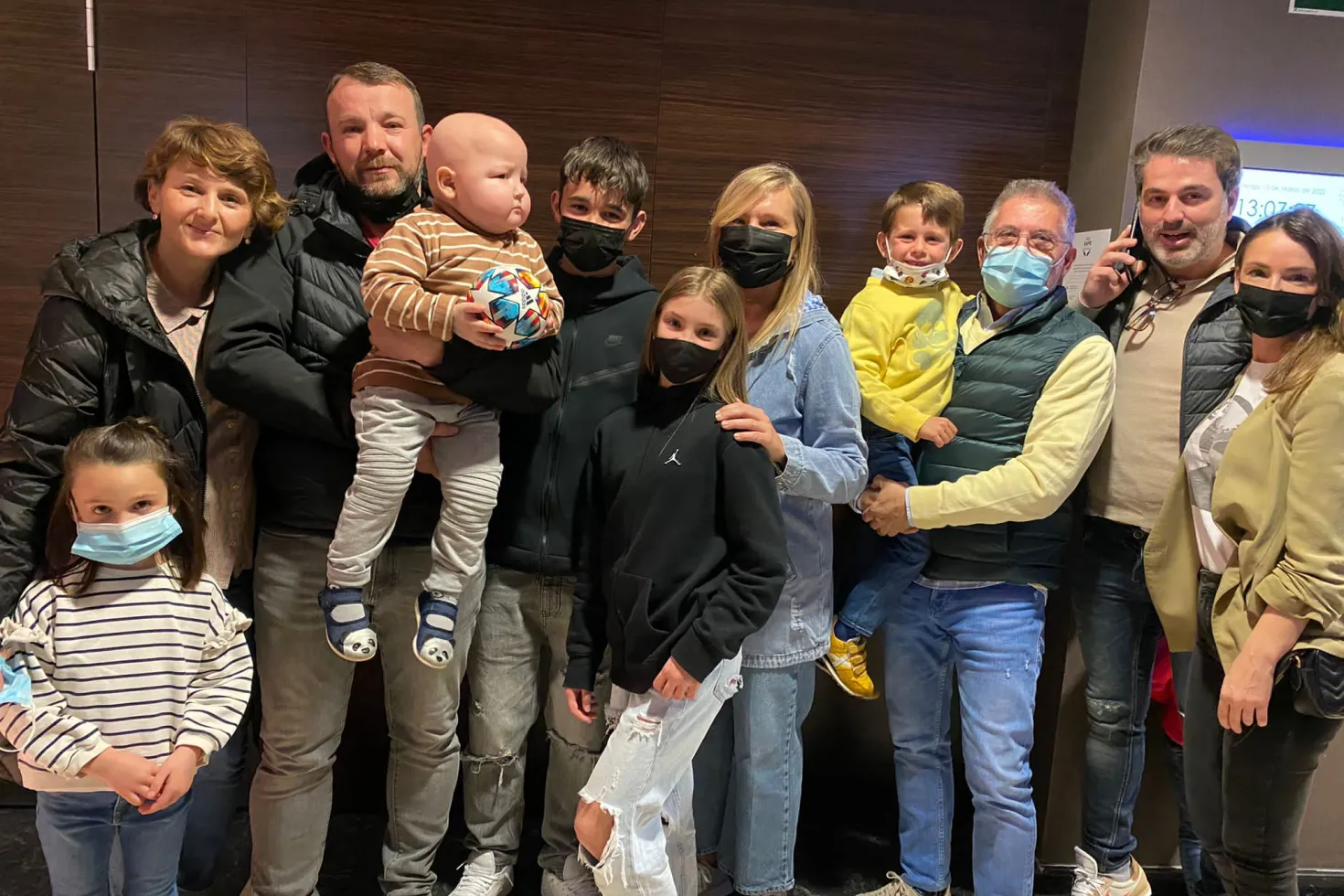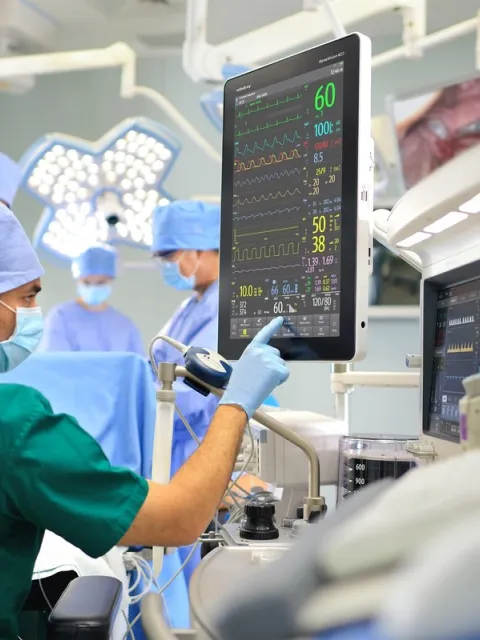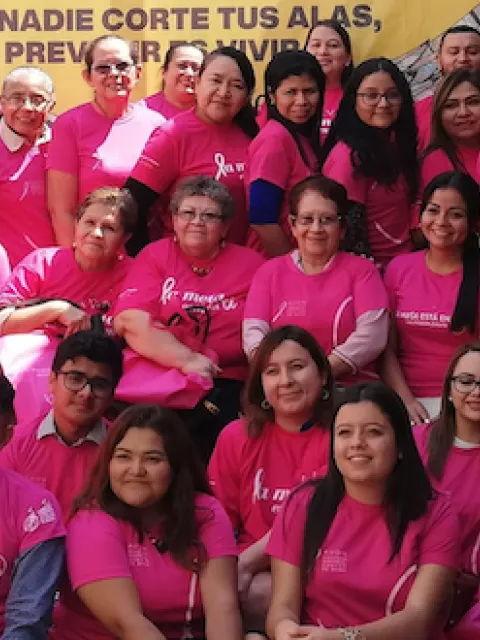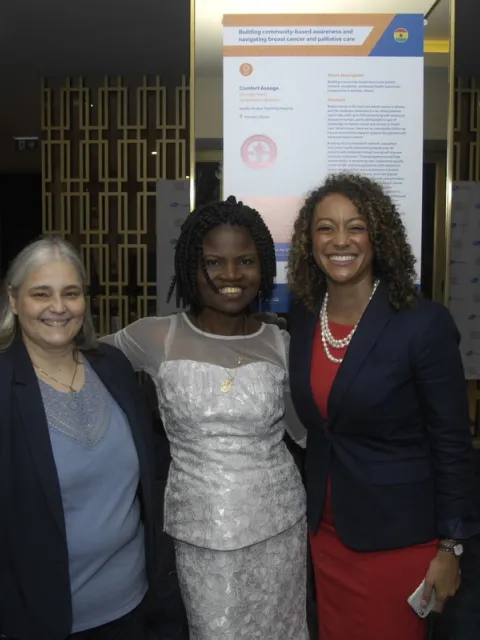Solidarity Fund to aid Ukrainian cancer patients
Following the Russian invasion of Ukraine, UICC set up a Solidarity Fund in response to its members’ requests to bridge funding into the region to support the needs of cancer organisations struggling to assist patients affected by the conflict.

The Solidarity Fund received donations over the amount of USD 1 million by early April 2022 and opened a call for grants for qualifying organisations. The donations were pooled and distributed to recipients on application, on the advice and guidance of an Advisory Board, and through a streamlined selection process established by UICC to ensure the legitimacy of the applying organisation and the quality and relevance of project applied for.
Organisations generously donating to the Fund are as follows:
- Dutch Cancer Society, who initiated the project,
- Danish Cancer Society,
- Swiss Cancer League
- Norwegian Cancer Society
- Cancer Society of Finland
- Icelandic Cancer Society
- European Society of Gynaecological Oncology (ESGO)
- European Network of Gynaecological Oncological Trial Groups (ENGOT)
- Nordic Society of Gynaecological Oncology (NSGO)
- Nordic Society of Gynaecological Oncology Clinical Trial Unit (NSGO-CTU)
- Swedish Cancer Society
- Spanish Association Against Cancer (AECC)
- Kom op tegen in Belgium
- International Gynecologic Cancer Society (IGCS)
- Barncancerfonden (Swedish Childhood Cancer Foundation)
The UICC Solidarity Fund has supported projects that help address the impact of the conflict on Ukrainian cancer patients and their families now and in the immediate future. The final grants were awarded in December 2023 before the Fund was exhausted.
In particular, the focus of the Fund has been on the following types of emergency support (but not limited to this list):
- Help to cover the operational costs of cancer organisations based in Ukraine to support their continued functioning at this time.
- Fund the acquisition of urgently required medicines and equipment for Ukrainian cancer patients.
- Contribute towards the costs of transporting Ukrainian cancer patients and their families.
- Contribute towards the costs of flying in expertise into Ukraine or surrounding regions.
- Support health workers in Ukraine or surrounding regions who are providing treatment and care to Ukrainian cancer patients.
Project Titles:
- OnkoUkraine - Support for Ukrainian cancer refugees in Poland
- OnkoUkraine - Support for Ukrainian cancer refugees in Poland (continuation).
Project Titles:
- Emergency Assistance to Cancer Departments of Ukrainian Hospitals.
- Fighting complications in children cancer patients.
Project Titles :
- Best support for cancer patients.
- Improvement in diagnostic and treatment in cancer patients.
Project Titles :
- Covering operating costs to support the functioning of the NGO "Athena. Women Against Cancer" at the moment and further sustainable development.
- Checking for BRCA1/2 mutations in breast cancer patients for optimizing the treatment and improving outcomes.
- NGS-testing for Ukrainian patients with NSCLC.
Project Titles :
- A Moldovan-Romanian Collaboration for the treatment of Ukrainian refugees with cancer currently.
- A Moldovan-Romanian Collaboration for the Treatment of Ukrainian refugees with cancer - Moldova.
- A Moldovan-Romanian Collaboration for the Treatment of Ukrainian refugees with cancer - Romania.
Project Titles :
- Mental health for Ukrainian patients with oncological diseases.
- Mental health for Ukrainian patients with oncological diseases (continuation).
Project Titles :
- Equipment for the National Cancer Institute.
- Acquisition an ultrasound machine and necessary equipment for a mobile medical platform that will help Ukrainians for free for timely diagnosis of cancer and precancerous conditions.
Project Title:
- Acquisition an ultrasound machine and necessary equipment for a mobile medical platform that will help Ukrainians for free for timely diagnosis of cancer and precancerous conditions.
Project Title :
- Coordination Headquarters for Assistance to Ukrainian Cancer Patients during the War.
Project Title :
- Social control over the public procurement system of cancer medicines, and providing free medical care for cancer patients under martial law in Ukraine.
Project Title :
- Cancer won’t wait for the war to end! Early detection is the key to successful treatment!
Project Title :
- Support for Ukrainian oncology patients.
Project Titles:
- Youth Cancer Europe's Ukrainian Crisis Response & Emergency Cancer Fund.
- Youth Cancer Europe's Ukrainian Crisis Response & Emergency Cancer Fund (continuation).
Project Titles :
- Mapping and dissemination of real-time cancer treatment capacity in Ukraine.
- Provision and Translation of Educational Content to Improve Cancer and Trauma Care in Ukraine.
- Support for training of Ukrainian oncology practitioners abroad.
Project Title :
- Assistance in restoring the work of an oncology clinic in Ukraine
Project Titles :
- Support of patients with breast cancer in Ukraine.
- Molecular testing of patients with ovarian and prostate cancer in Ukraine.
- Molecular testing of Ukrainian patients with colorectal carcinoma.
Project Title :
- Best support for cancer patients after ablation.
Project Titles :
- Psychological support for cancer patients and oncological medical staff in Ukraine under active combat actions.
- Assistance to cancer patients in the Kharkiv region of Ukraine during the war.
Project Titles :
- Procurement of functional medical beds for Cherkasy Regional Cancer Center.
- Continuous monitoring of the patients’ condition to increase pediatric cancer patients’ safety.
- Arrangement of paediatric oncology bone marrow transplantation units with medical equipment and furniture.
Project Titles :
- Helping Ukrainian radiotherapy centres with disposable immobilization devices and boluses.
- Helping Ukrainian radiotherapy centres with disposable immobilization devices (continuation).
- Helping Ukrainian radiotherapy centres with disposable immobilization devices (continuation).
Project Titles :
- Morphological and immunohistochemical diagnosis of breast cancer in women of the South-East of Ukraine during the war.
- Psychological support of cancer patients and their families in the city of Zaporozhye (Ukraine) during the war.
- Morphological and immunohistochemical diagnosis of breast cancer in women of the South-East of Ukraine during the war (continuation).
- Treatment of severe morphine-resistant pain in patients with locally advanced primary unresectable head and neck cancer with radiofrequency thermal ablation of cranial nerve branches.

UICC has a long history of building capacity for cancer organisations globally through grant making.
Grants

As part of its Breast Cancer Programme, UICC has awarded 19 grants to UICC members to support evidence-based projects focused on improving the availability of and access to early detection of breast cancer.
Grants for the early detection of breast cancer

Metastatic Breast Cancer (MBC) accounts for 90% of breast cancer deaths. To tackle this growing cancer burden in 2015 UICC teamed up with Pfizer Oncology to launch the Seeding Progress and Resources for the Cancer Community (SPARC) MBC Challenge
Addressing Metastatic Breast Cancer (MBC)
Last update
Tuesday 03 December 2024